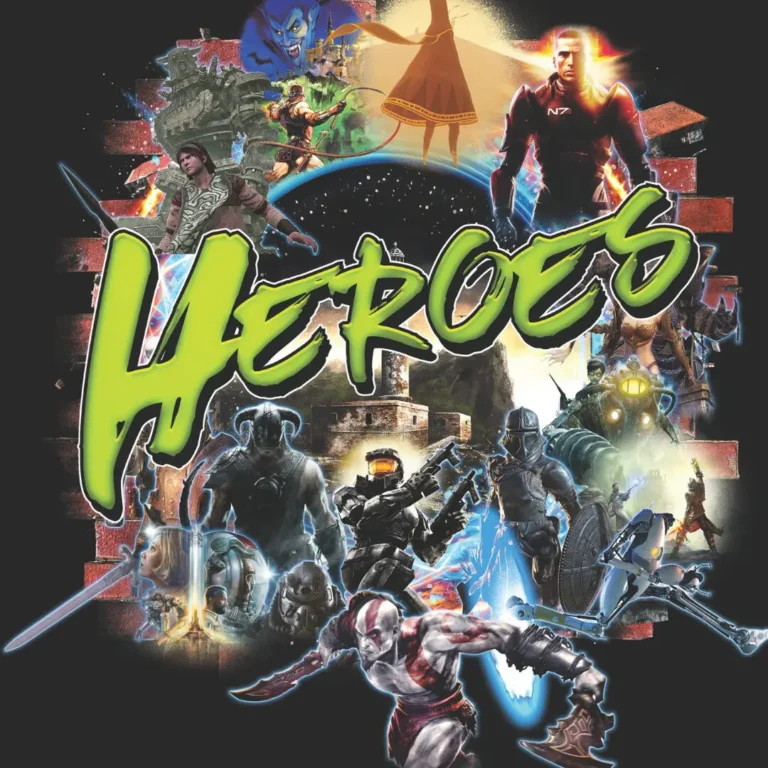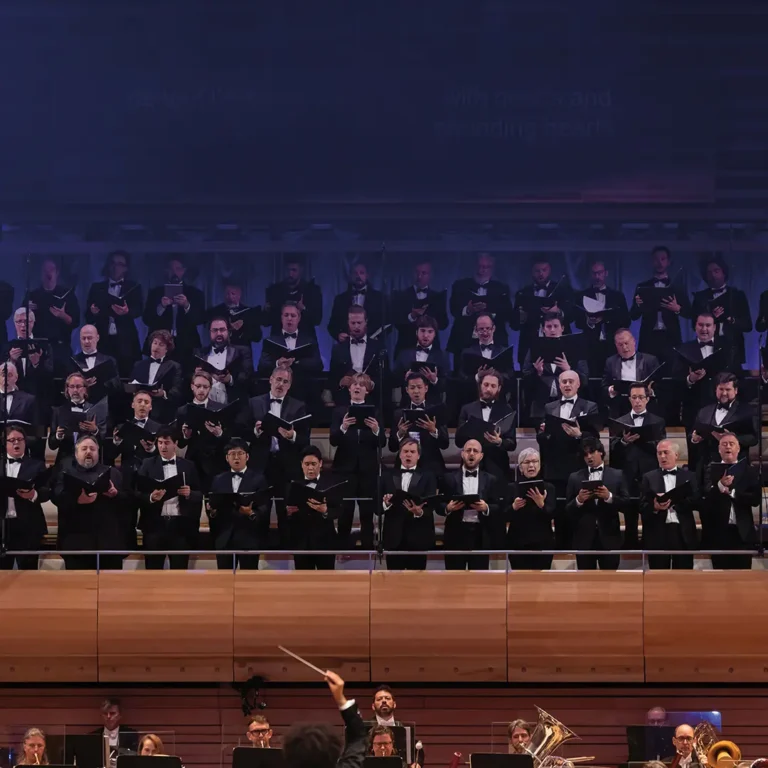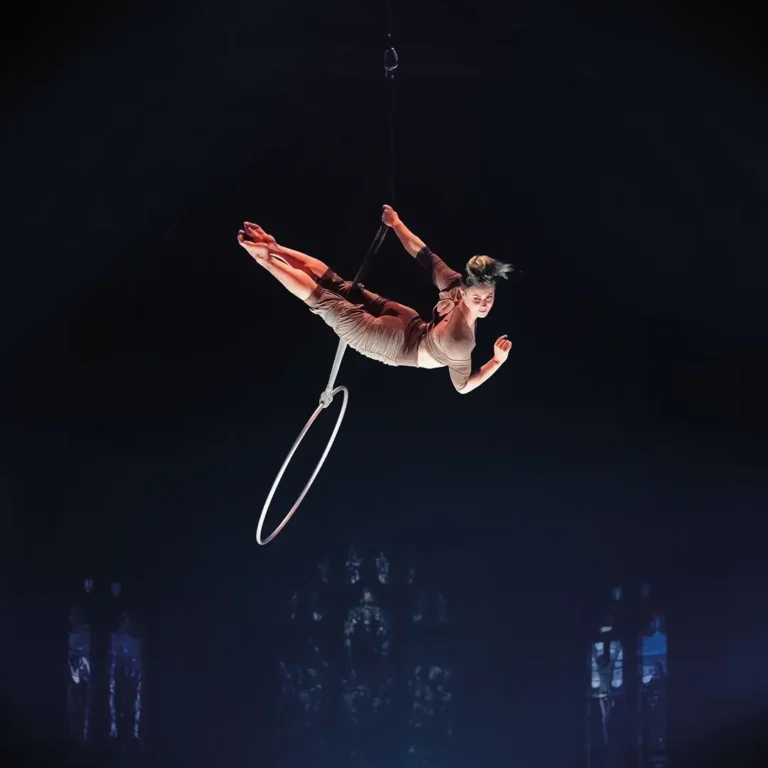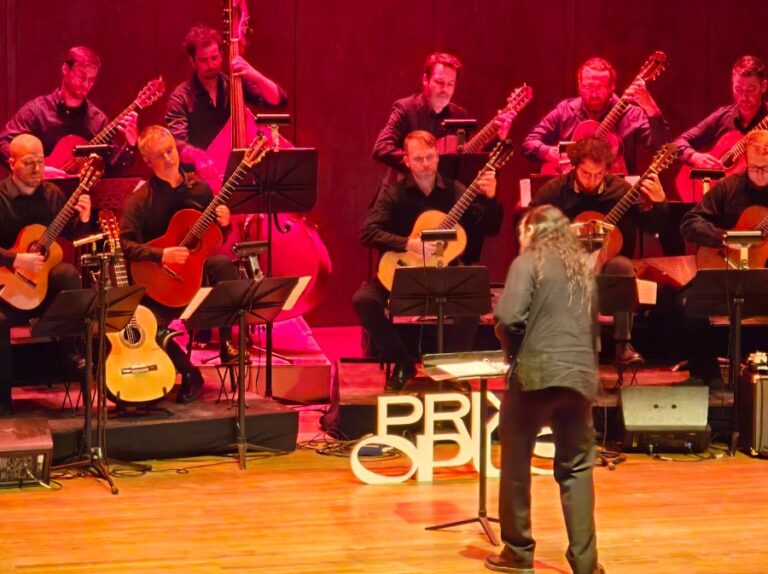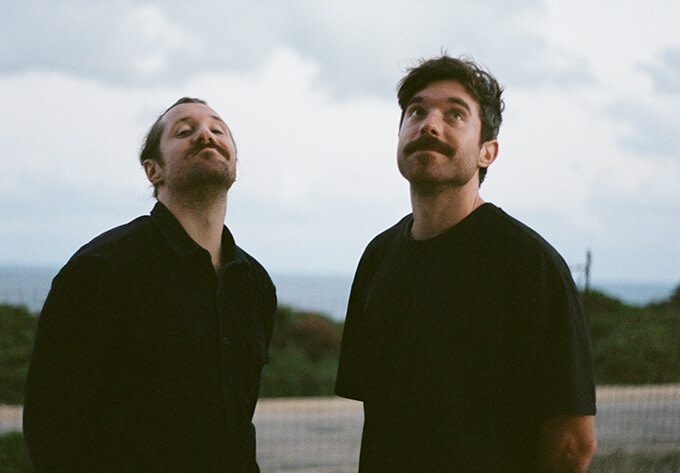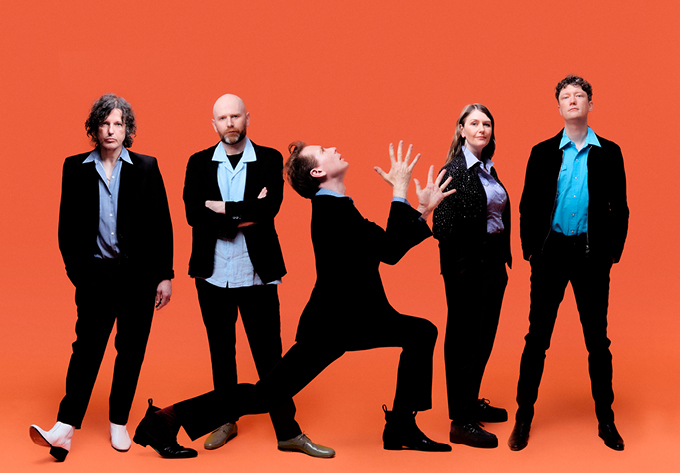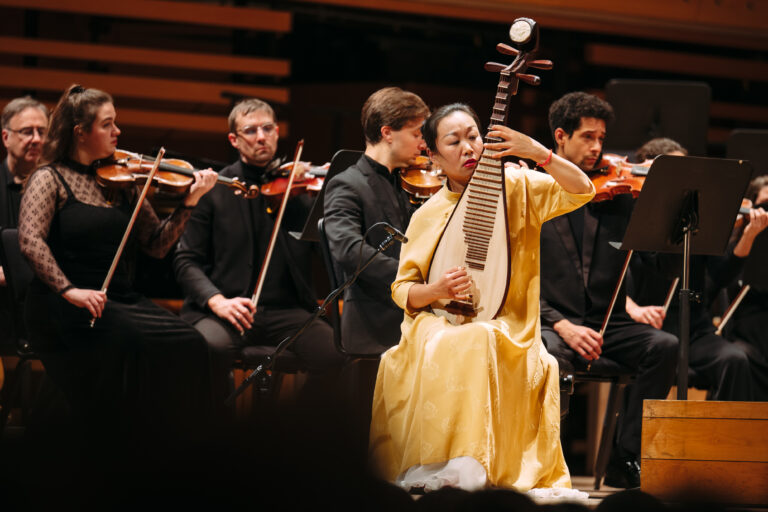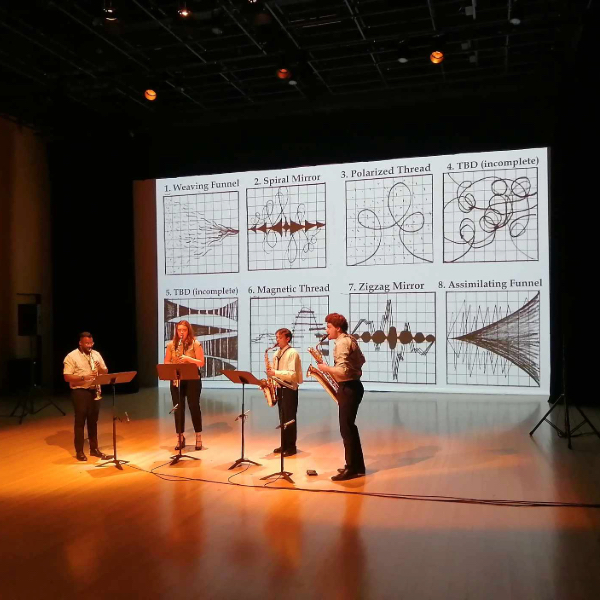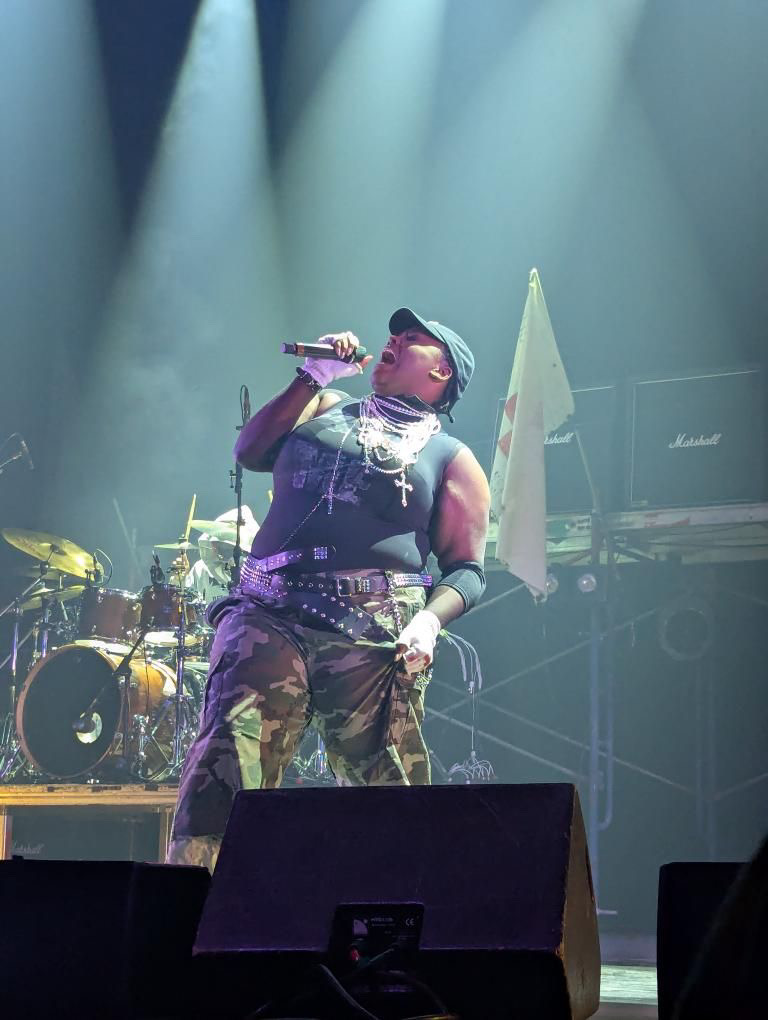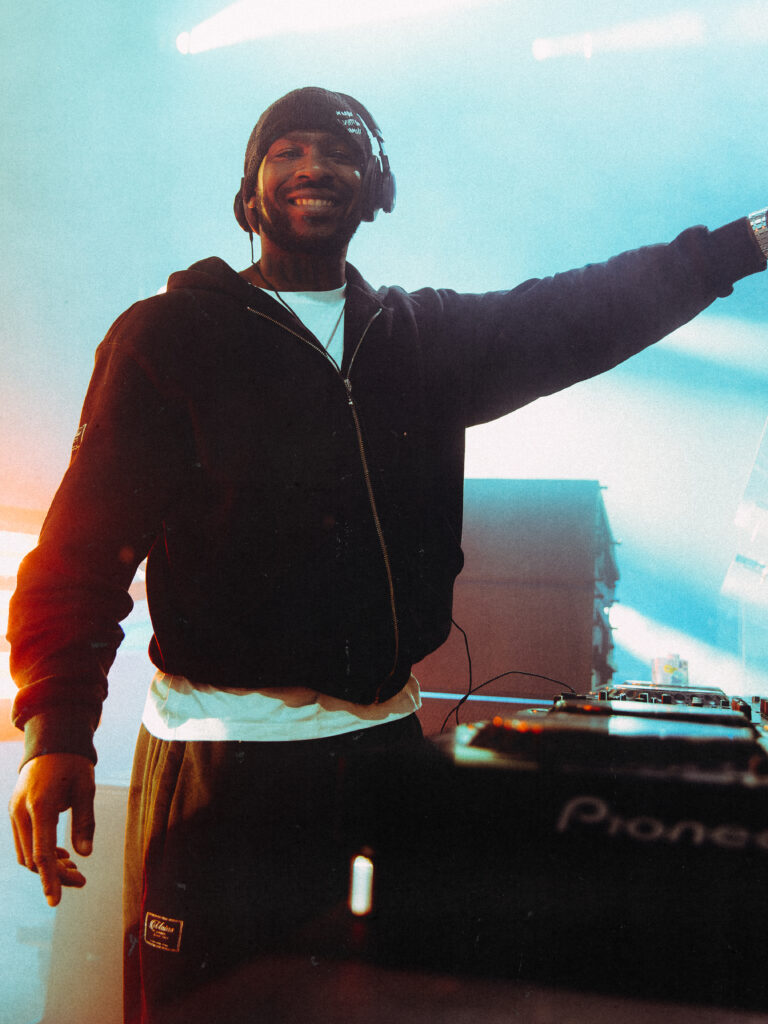On Sunday, February 2, the entire Quebec concert music community gathered at Salle Bourgie to celebrate the highlights of the 2023-2024 season. Presented at Salle Bourgie by the Conseil québécois de la musique and broadcast (CMQ) on its FB page as well as on PAN M 360, this 28th Opus Awards Gala was, for the fourth year running, hosted by the enthusiastic Jocelyn Lebeau. A total of 32 awards were presented at a ceremony punctuated by interview blocks with the winners, encouraging dynamic exchanges on their respective projects.
This year’s Prix Hommage was awarded to Michel Levasseur to celebrate his 40 years at the helm of the Festival international de musique actuelle de Victoriaville (FIMAV). A key figure and builder of the experimental music and improvisation scene, this tribute was an opportunity to shine the spotlight on his hard work, which has greatly contributed to the development of the Quebec music scene.
Video testimonials from FIMAV loyalists Jean Derome and René Lussier were among the evening’s highlights. The tribute concluded by underlining the importance of the support of those around him throughout his career, as the audience gave a standing ovation to his family, friends and partners.
The evening’s musical highlight was provided by the Forestare guitar ensemble and its 13 performers, who took us from Denis Gougeon’s Une petite musique de nuit d’été to Bach, with the third movement of the Brandenburg Concerto No. 3 in G major closing the gala. Its conductor, Pascal Germain Berardi, also won an Opus for Musical Event of the Year, held at FIMAV in Bois-Francs: Basileus, an oratorio in 4 acts featuring the ensembles Horizon (brass), Forestare (guitars), Sixtrum (percussion) and the Growlers Choir (metal voices).
Traditional Québécois music was in the spotlight this year, with an outstanding performance by three traditional Québécois music duos. First, Cédric Dind-Lavoie and Dâvi Simard performed Alphonse Morneau’s Tenant mon frère from the album Archives, winner of the Concert traditionnel québécois de l’année award. A project in which recordings by the chansonniers of yesteryear are reborn and sublimated by an ambient musical setting. An album not to be missed. Then, Nicolas Boulerice and Frédéric Samson delivered Trois beaux garçons, before Alexis Chartrand, on violin and podorythmy, brought his energy to bear on Isidore Soucy’s Le Cyclone, accompanied by Nicolas Babineau on guitar.
Continuing this string resonance, guitarists Adam Cicchillitti and Stevan Cowan performed a beautiful arrangement of Germaine Tailleferre’s Sonata for Harp, with the two guitars in symbiosis, an arrangement sublimated by a meticulous sound system.
Among the double winners, pianist, composer and improviser Marianne Trudel was crowned Composer of the Year and received the award for Jazz Album of the Year for Time Poem: La joie de l’éphémère. Having returned in extremis from a concert on the Magdalen Islands, this is yet another distinction for this artist with a prolific career.
Roozbeh Tabandeh, an interdisciplinary artist nourished by Iranian and Western musical traditions, also distinguished himself by winning the Inclusion and Diversity and Discovery of the Year awards.
Montreal string ensemble collectif9, directed by Thibault Bertin-Maghit, walked away with the Artistic Direction and Performer of the Year awards.
Once again this year, I Musici distinguished itself by winning Creation of the Year with Denis Gougeon’s Spassiba Yuli, as well as Album of the Year – World Music for its participation in Continuum with Turkish artist Didem Basar under the label of the Centre des musiciens du monde.
The Orchestre Métropolitain, meanwhile, walked away with two Opus awards for its season-closing production of Aida, as well as for the Leningrad Symphony.
Early in the morning, the Concert of the Year Opus – Medieval, Renaissance and Baroque Music – was won by Arion Orchestre Baroque, for Aci, Galatea e Polifemo, conducted by guest conductor Francesco Corti, and featuring soprano Kateryna Kasper, contralto Margherita Maria Sala and bass Lisandro Abadie.
Finally, the interview format opened the door to some interesting discussions. Marianne Trudel and composer and improviser Joane Hétu, among others, spoke movingly of the contribution of sound engineers Rob Heaney and Bernard Grenon to the genesis of their works. Both passed away suddenly in recent years, leaving an indelible mark on the Quebec music scene. Their premature departure, like those of so many other artisans in the shadows, reminded us of how lucky we are to be here and to be making art,” said Marianne Trudel.
Congratulations to all the finalists and winners.
I invite you to check out PAN M 360’s other Opus Awards content.
Here is the list of winners for the 2023-2024 season:
Concerts
Concert of the year – Medieval, Renaissance and Baroque music
Aci, Galatea e Polifemo, Arion Orchestre Baroque, Francesco Corti, guest conductor, Kateryna Kasper, soprano, Margherita Maria Sala, contralto, Lisandro Abadie, bass, January 12 to 14, 2024
Concert of the year – Classical, Romantic and Post-Romantic music
Aida season finale, Orchestre Métropolitain, Yannick Nézet-Séguin, conductor, Angel Blue, Sarah Dufresne, sopranos, Matthew Cairns, SeokJong Baek, tenors, Ambrogio Maestri, baritone, Alexandros Stavrakakis, Morris Robinson, basses, Choeur Métropolitain, Festival de Lanaudière, August 4, 2024
Concert of the year – Modern and contemporary music
Two, Molinari Quartet, February 16, 2024
Concert of the Year – Contemporary and electroacoustic music
Monnomest, Ensemble SuperMusique, Joane Hétu, conductor, Vergil Sharkya, conductor, Productions SuperMusique, co-production Groupe Le Vivier, November 23, 2023
Concert of the Year – Jazz Music, accompanied by a $5,000 gift card from Instruments de musique Long & McQuade.
Sport national, Hugo Blouin, September 28, 2023
Concert of the Year – World Music
Continuum, Didem Başar, kanun, Patrick Graham, percussion, Etienne Lafrance, double bass, Quatuor Andara, Centre des musiciens du monde, February 13, 2024
Concert of the year – Traditional music from Quebec
ARCHIVES, Cédric Dind-Lavoie, multi-instrumentalist, Alexis Chartrand and/or Dâvi Simard, violins, November 15 and 19, December 10 and 16, 2023
Concert of the year – Répertoires multiples
Leningrad Symphony, Orchestre Métropolitain, Yannick Nézet-Séguin, conductor, Maria Dueñas, violin, November 18, 2023
Concert of the year – Ancient, classical, romantic, modern, postmodern impulses
Fabula femina, Cordâme, August 10, 2024
Creation of the year
Spassiba Yuli, for 2 cellos and strings, Denis Gougeon, Yuli’s legacy: Stéphane Tétreault and Bryan Cheng, I Musici de Montréal, April 25, 2024
Production of the Year – Young Audience, accompanied by $5,000 from the Ministère de la Culture et des Communications
J’m’en viens chez vous, Bon Débarras, February 11, 2024
Albums
Album of the year – Medieval, Renaissance and Baroque music
Calcutta 1789: At the crossroads of Europe and India, Christopher Palameta, Notturna, ATMA Classique
Album of the year – Classical, Romantic, Post-Romantic music
16 Histoires de guitares – Vol. III, David Jacques, ATMA Classique
Album of the year – Modern, contemporary music
Confluence, David Therrien Brongo, Ravello Records
Album of the Year – Contemporary and Electroacoustic Music
Limaçon, Léa Boudreau, empreintes DIGITALes
Album of the Year – Jazz
Marianne Trudel-Time Poem: La joie de l’éphémère, Trio Marianne Trudel, Productions Marianne Trudel, Indépendant
Album of the Year – World Music, accompanied by a $5,000 Mundial Montréal Mentoring & Conference package offered by Mundial Montréal.
Continuum, Didem Başar, Patrick Graham, Jean-François Rivest, I Musici de Montréal, Centre des musiciens du monde
Album of the Year – Quebec Traditional Music
Layon, Nicolas Pellerin and Les Grands Hurleurs, La Compagnie du Nord
Album of the Year – Ancient, classical, romantic, modern and postmodern impulses
Cendres, Vanessa Marcoux, Indépendant
Writing
Article of the year
“Du son vers la forme, le sens… l’Autre… : spectral thought and engaged art in the mixed works of Serge Provost”, Jimmie LeBlanc, Circuit, musiques contemporaines, May 1, 2024
Special awards
Opus Montréal Prize – Inclusion and Diversity, accompanied by $10,000 from the Conseil des arts de Montréal.
Roozbeh Tabandeh, Ensemble Paramirabo et Chants Libres, Songs of the Drowning, August 24, 2024
Prix Opus Québec
Festival Québec Jazz en Juin, June 20 to 30, 2024
Prix Opus Régions
Festival Ripon trad, September 14 to 17, 2023
Composer of the Year, accompanied by $10,000 from the Conseil des arts et des lettres du Québec.
Marianne Trudel
Discovery of the Year, accompanied by a video production courtesy of Télé-Québec’s La Fabrique culturelle.
Roozbeh Tabandeh, composer
Multidisciplinary Broadcaster of the Year
Salle Pauline-Julien
Specialized Broadcaster of the Year
Domaine Forget de Charlevoix
Artistic Director of the Year
Thibault Bertin-Maghit, collectif9
